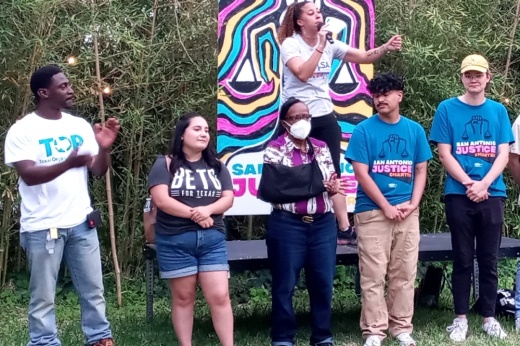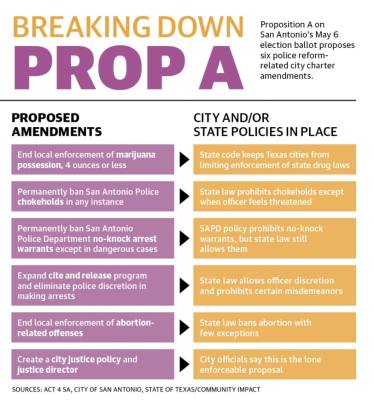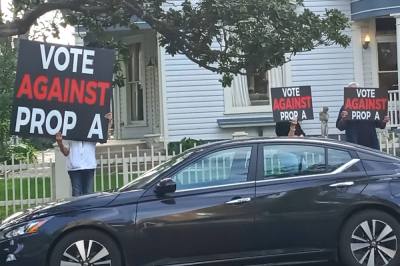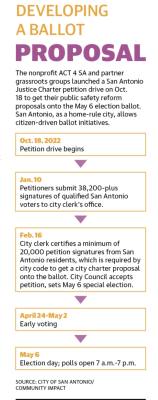San Antonio activists petitioned to get a proposition on the local May 6 election ballot that they say, if passed, will increase people’s trust in police, boost police accountability, save money by reducing jailings and decriminalize certain individual actions otherwise deemed unlawful by the state.
But Proposition A has been criticized by some city leaders and organizations who claim the “justice charter” flouts overarching laws, would be unenforceable and could increase crime if approved.
Organized by police reform activist group ACT 4 SA, the ballot initiative Proposition A contains six criminal justice measures in what will be decided in an all-or-nothing vote.
The proposal calls for ending local criminalization of abortion and low-level marijuana possession, expanding a cite-and-release program, creating a city justice director position, and banning police use of chokeholds and no-knock warrants.
ACT 4 SA Executive Director Ananda Tomas said her group and local partner organizations were partially moved by past police misconduct cases—such as a San Antonio police officer fatally shooting unarmed 13-year-old Andre “AJ” Hernandez on June 3—to petition the city of San Antonio and propose a range of city charter amendments designed to help reduce what police reform activists call unnecessary arrests, improve community/police relations and reallocate public resources to other overarching city issues, such as homelessness.
“We will be saving money, keeping families together and stopping the unnecessary overcrowding of jails,” Tomas said.
Not everyone agrees.
“Activists are proposing several reforms that will only hinder the effective policing and community safety we have today,” said Danny Diaz, San Antonio Police Officers Association president.
Critics also agree with San Antonio City Attorney Andy Segovia, who told Community Impact the charter is unenforceable.
“The city will not enforce aspects of the proposals that are contrary to state law,” Segovia said.
A petition’s origins
The road to placing Proposition A on the May 6 ballot began Oct. 18 when ACT 4 SA and partners such as SA Stands and the Texas Organizing Project began collecting signatures of at least 35,000 registered voters, Tomas said.
City code requires proposed city charter changes to collect at least 20,000 valid signatures to make it on the ballot.
Petitioners on Jan. 10 submitted more than 38,200 signatures, 20,000 of which were later verified by the city clerk’s office, officials said.
The council voted Feb. 16 to place the charter amendment proposal on the May 6 ballot, the full language of which can be found at the Bexar County Elections website. The city also provides a Q&A webpage about Proposition A on the city website.
State law required the council to put the proposal onto the ballot, because petition signatures were certified, but the council’s vote does not reflect the proposal’s merits, Segovia said.
“That will be up to voters,” he said.
At a March 16 justice charter campaign launch party in San Antonio’s King William District, Tomas said ACT 4 SA and others felt inaction from local police and policymakers, so they petitioned for a city charter election by proposing six public safety initiatives.
Tomas said the groups sought to keep things simple for voters by offering all six desired initiatives in a single ballot proposition.
“That’s what the justice charter is—it’s literally us the people legislating for ourselves and saying enough is enough, and if you won’t do it, we will,” Tomas said.
Abortion decriminalization
Proposition A supporters said their belief in individual rights and responsibility moved them to propose nixing local enforcement of state laws covering access to abortion services.
Yaneth Flores, public policy director at Avow Texas, an abortion rights advocacy nonprofit, said after the U.S. Supreme Court overturned Roe v. Wade, the state banned abortion. She said a pregnant woman considering an abortion should not be penalized or forced to navigate financial and logistical challenges to access reproductive health services in another state.
“What we’re going to do is take care of one another and make sure people in this city aren’t criminalized for seeking health care,” Flores said.
But groups, such as the Texas Alliance for Life, an antiabortion organization, oppose Proposition A, saying the proposals largely go against state law.
TAL petitioned the Texas Supreme Court on Feb. 10 to break up Proposition A into individual ballot proposals, which was supported by Texas Attorney General Ken Paxton, who on Feb. 16 said state law requires charter amendments to include only one ballot subject.
The Texas Supreme Court ruled March 17 that voters must first have their say on Proposition A before any legal challenges are issued against the proposal.
“Sufficient post-election remedies exist that permit the voter to challenge any infirmity in the proposed amendment and its placement on the ballot—after the voters have had their say,” Justice Jane Bland wrote in the court’s majority opinion.
TAL’s Communications Director Amy O’Donnell said her group disagreed with both the court’s ruling and Proposition A.
“This precedent invites municipalities to disregard well-established election laws regarding charter amendments—whether they pertain to protections for unborn babies or other issues—an unintended but foreseeable consequence,” O’Donnell said.
Marijuana decriminalization
Advocates said personal choice and responsibility also buoyed them to seek ending arrests for holding 4 ounces or less of marijuana with few exceptions.
Executive Director Julie Oliver of Ground Game Texas said the charter shifts police resources toward “more pressing” public safety concerns.
Ground Game Texas in 2022 backed successful, similar movements to decriminalize marijuana in cities, such as Austin, San Marcos and Denton.
“San Antonio doesn’t have the resources to engage every area of town or go after every person who’s seen as a criminal,” Oliver said.
But Segovia said, while the city cannot advocate for or against a ballot measure, voters must understand that police may still arrest people found violating Texas’ abortion or marijuana laws, even if Proposition A passes.
“No city in any state of the country can change their state law,” he said.
Cite and release
Proposition A backers said they want to decriminalize other low-level, nonviolent offenses, such as theft of items valued $750 or less, by expanding Bexar County’s cite and release program.
Proposition A advocates also propose totally removing the discretion that San Antonio police currently have to arrest someone for certain nonviolent, low-level crimes allowed by the state.
Per county rules, the district attorney’s office may reject a citation, refer the citation for a diversion program or refer the case for legal action.
Since the program’s launch on July 1, 2019, the county has avoided 7,464 bookings in lieu of a citation, saving the county $5.6 million in booking costs, through Dec. 31, 2022, according to the Bexar County District Attorney’s office.
Proposition A backers said a cite and release program mainly helps people of limited means who may be otherwise jailed for a nonviolent offense to stay with family, remain in school, keep their job and make amends to society in another way.
“There’s no reason that a mother who had to steal diapers or baby food to make sure her baby is healthy and safe should be in jail,” Tomas said. “Jail is not the solution.”
But Proposition A detractors said removing police discretion and expanding the cite and release program could increase crime.
“The truth is activists want to promote criminal leniency by expanding our cite and release policy for several crimes,” Diaz said.
Mayor Ron Nirenberg, all three current north San Antonio City Council members, several local business advocacy groups and some property owner associations have voiced opposition to Proposition A, specifically the cite and release proposal.
Business organizations such as the North San Antonio Chamber of Commerce said expanding the program and removing police officer discretion in matters such as theft, property damage or graffiti could encourage such behavior and negatively affect the community.
“This provision could have a significant impact on all property owners, including North Chamber members,” NSACC board said in a resolution passed March 10.
Banning no-knock warrants
Saying there is a need to reduce a risk of excessive police force, Proposition A supporters said permanently prohibiting police use of chokeholds in any instance, and forbidding use of no-knock warrants, even with few exceptions, would contribute to reform of local police practices.
Roberto Trevino, former San Antonio District 1 council member, speaking at the March 16 Proposition A campaign event said disallowing no-knock warrants and chokeholds would raise residents’ trust in policing.
“This is about human rights. This is about dignity. This is about protecting people,” Trevino said.
But Segovia said state law already bars chokeholds except where an officer feels threatened and that SAPD policy already bars no-knock warrants.
Segovia also said ballot language seeking to create “additional policies concerning the issuing of warrants” further renders Proposition A unenforceable.
“The proposal ostensibly puts requirements on judges regarding when they can issue warrants,” Segovia said. “We can’t tell judges what to do.”
Justice director proposed
Proposition A contains a sixth initiative, in which voter approval would compel the City Council to create and appoint a city justice director.
This director would have no law enforcement ties and would oversee implementation of the other Proposition A initiatives and future criminal justice reform measures covering issues, such as mass incarceration, police accountability and allocation of public safety resources, Tomas said.
Segovia said the city has no concerns about the justice director idea, but the San Antonio Police Officers Association opposes it because Proposition A advocates want to keep anyone with law enforcement connections from being appointed to the position.
“Taxpayers will be paying for this individual’s salary as well as their entire staff. How is this going to save scarce public resources?” Diaz said.
Jon Taylor, political science professor at the University of Texas at San Antonio, described Prop A as both an ambitious, progressive, proposal and a curse.
“I say this because Prop A laudably tries to address community concerns about a variety of social justice issues, but may have taken the wrong approach to getting this on the ballot,” Taylor said.
Taylor said he understands the intent of justice charter advocates, but blending what might be politically popular initiatives, such as decriminalizing abortion and marijuana, with other policing measures may be too much of an ask for voters.
“But by combining all of the proposals into one Charter amendment, proponents of Prop A risk losing simultaneously on all of them,” Taylor said. “That could delay or derail political support for reforms on police chokeholds, no-knock warrants, bail, and other restorative justice issues.”
Tomas said Act 4 SA and their partner groups have an uphill campaign against opposition from the San Antonio Police Officers Association, TAL and other groups and civic leaders.
“We rely on the truth, facts, hope and the literal fight to save lives,” Tomas said.
Early voting hours are 8 a.m.-6 p.m. April 24-27 and 8 a.m.-8 p.m. April 29-May 2. Polls are closed on Fiesta Battle of Flowers Parade holiday, April 28, and on April 30.
Details on early voting sites are available at Bexar County’s elections website. Election day poling hours will be 7 a.m.-7 p.m.









